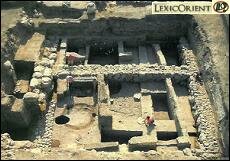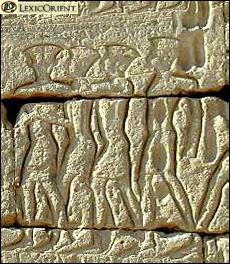
|
 |


Ancient World /
Philistines
Hebrew: plishtim
Ancient Egyptian: Peleset; Prst

 |




Excavations at Ekron, central city of the Philistines.



From Medinet Habu, Luxor, Egypt, showing captivated Philistines.

|
People living in Palestine since the 12th century BCE.
 It is from the Philistines that the land designation 'Palestine' has been derived. Goliath, from the Biblical battle between with future King David, was a Philistine. It is from the Philistines that the land designation 'Palestine' has been derived. Goliath, from the Biblical battle between with future King David, was a Philistine.
Political organization
The territory they inhabited was the Palestinian coast into Judah, forming a federation of 5 cities: Gaza, Ashkelon, Ashdod, Gath and Ekron) and was known as Philistia; the Land of the Philistines. Each city enjoyed great autonomy and was ruled by a seranim, the head of a council. After their defeat to King David of Judah, the seranim was replaced with kings, ruling virtually independent from a council.
Society
The Philistines were famous for their skills in producing iron products.
Ethnic origins
The Philistines originated from somewhere in the Aegean Sea named Caphtor, which possibly was Crete. Archaeological finds show many similarities with Mycenean cultures, like pottery with links to 13th century Mycenean pottery. They were not ethnically Semitic and did not have a Semitic culture, though they soon adopted to local culture, religion and language. The Philistines never left Palestine, but merged since the late 1st millennium BCE with other peoples of the region.
Language
The Philistines had their own language, most probably of Indo-European origin, but there are no written documents from it. Their language was soon replaced with Canaanite, then Aramaic and eventually Greek.
Religion
Of their religion, very little is known. Their gods are mentioned in Biblical and other sources, but then renamed to fit Semitic categories or language.
History
1190: The Philistines either join the Sea People,- or they are one of the Sea Peoples,- in an invasion of Egypt. Egyptian records name them prst. They are expelled by King Ramses 3.
12th century BCE: After being expelled from Egypt, the Philistines settle along the Palestinian coast, south of Joppa (modern Tel Aviv, Israel). According to Egyptian sources, this happened under the administration of Ramses 3.
The Philistines advance in from the coast, and soon come in conflict with the Israelites.
Around 1050: Part of the Judean hill country is occupied.
10th century: The Philistines are defeated by King David of Judah. The Philistines would thereafter form small city communities.
Israel and Judah splits, allowing the Philistines to regroup as larger state structures.
850: The Philistines sack Jerusalem.
8th century: The Philistines are defeated by Hezekiah, later king of Judah.
732: Philistine cities become vassals under the Assyrians.
Late 7th century: Egypt replaces Assyria as lords of the Philistia.
Early 6th century: Babylonia conquers the Philistine vassal cities. From this time on, the Philistine identity would disappear and they become part of other peoples.
|
|

